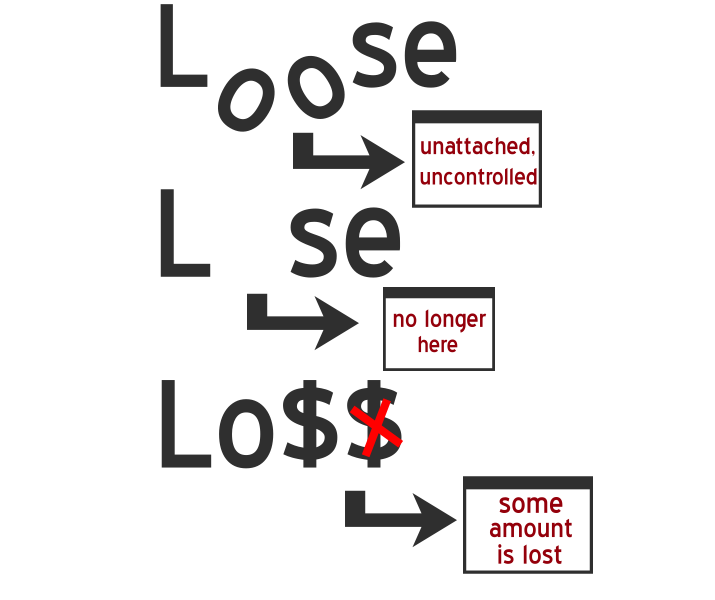Language can often be a tricky maze, where words may seem similar but carry distinct meanings. The terms "lost" and "loss" are two such words that frequently create confusion, especially among those who are still grasping the intricacies of the English language. Misusing these terms can lead to misunderstandings and can affect both written and verbal communication. Grasping the differences between these two words is not just a matter of vocabulary; it is essential for effective communication. In this article, we will delve into the meanings, usage, and context of "lost" and "loss," helping you differentiate between the two in a clear and concise manner.
Whether you are a student, a professional, or simply someone who loves to explore the richness of the English language, knowing how to use "lost" and "loss" correctly can add depth to your communication skills. This article will break down the nuances of these terms, discuss their grammatical roles, and provide examples to ensure you never confuse them again. Let’s embark on this linguistic journey to understand "lost vs loss" more thoroughly.
By the end of this article, you will not only distinguish between "lost" and "loss," but you will also appreciate the beauty of the English language as it allows for such nuanced expressions. So, sit back and get ready to enhance your language skills!
What Does "Lost" Mean?
The term "lost" serves as the past participle of the verb "lose." It generally refers to the state of having misplaced something or someone, unable to find it or them. The emotional weight attached to "lost" often conveys a sense of absence, whether it’s a physical object or an emotional state.
How is "Lost" Used in Sentences?
Using "lost" correctly requires an understanding of the context in which it is applied. Here are some examples:
- I lost my keys this morning.
- She felt lost after her best friend moved away.
- The puppy got lost in the park.
What Does "Loss" Mean?
On the other hand, "loss" is a noun that describes the act or state of losing something. It is often used in emotional contexts, such as the loss of a loved one, or in financial situations, like a business experiencing a loss in revenue.
How is "Loss" Used in Sentences?
Understanding how to use "loss" in a sentence can help you convey the gravity of a situation. Here are some examples:
- The loss of her grandmother was devastating.
- After reviewing the financial report, the company acknowledged a significant loss.
- He felt a deep sense of loss when he moved away from his hometown.
Lost vs Loss: What’s the Key Difference?
The primary difference between "lost" and "loss" lies in their grammatical roles and implications. "Lost" is an adjective or verb, indicating a state or action, while "loss" is a noun, reflecting the condition or experience of losing. Understanding this distinction is crucial for effective communication.
Can "Lost" and "Loss" Be Used Interchangeably?
No, "lost" and "loss" cannot be used interchangeably. Using them incorrectly can lead to confusion. For example, saying "I feel lost of my pet" is incorrect; it should be "I feel the loss of my pet." Recognizing the difference will enhance your clarity in conversation.
How Do Context and Emotion Influence "Lost" and "Loss"?
Both "lost" and "loss" carry emotional weight, but they do so in different ways. The term "lost" often conveys a feeling of disorientation or confusion, while "loss" signifies a more concrete experience, often involving grief or regret. Understanding the emotional undertones associated with these words can help you convey your feelings more accurately.
Are There Synonyms for "Lost" and "Loss"?
Yes, both "lost" and "loss" have synonyms that can be used depending on the context:
- Synonyms for "Lost": misplaced, missing, gone
- Synonyms for "Loss": deprivation, forfeiture, disappearance
Can Understanding "Lost vs Loss" Enhance Your Communication Skills?
Absolutely! A solid grasp of the differences between "lost" and "loss" can significantly enhance your communication skills. It allows you to express yourself more clearly and accurately, reducing the chance of misunderstandings in both verbal and written forms. This understanding can be particularly beneficial in professional settings, where clarity is paramount.
Conclusion: Mastering "Lost vs Loss"
In conclusion, the terms "lost" and "loss" may appear similar at first glance, but they serve different purposes in the English language. "Lost" is an adjective or verb that describes the state of having misplaced something, while "loss" is a noun that reflects the act of losing. By mastering the nuances of these terms, you can enhance your overall communication skills and express yourself more effectively. So the next time you find yourself contemplating the "lost vs loss" debate, remember the distinctions we discussed, and you will navigate these waters with confidence!



